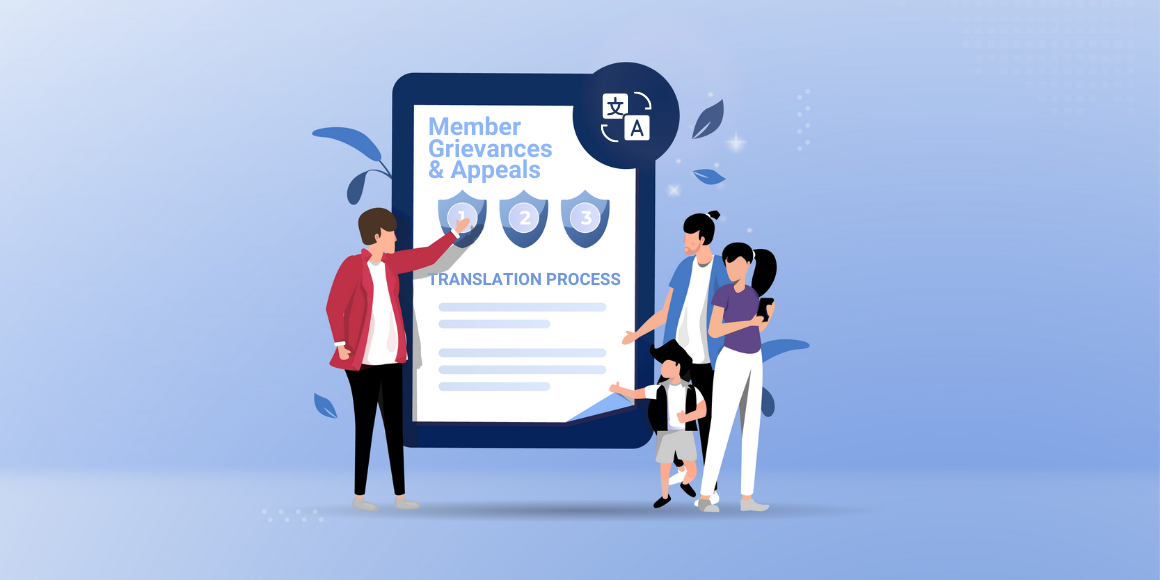Have you evaluated your process for translating member grievances and appeals? Even the most conscientious Managed Care Organizations (MCOs) have disputes with patients and their providers. These can take the form of grievances, where a patient feels they’ve been treated poorly by an MCO employee, or appeals when a patient is denied benefits and challenges that denial.
To protect patient rights, plans are required to follow specific procedures regarding any denial of benefits, along with any appeals that follow and any grievances reported by members. Patients are entitled to protection regardless of language, so these requirements include offering translations for Limited English Proficiency (LEP) patients.
Grievances, Appeals and Translation Compliance
MCOs (or Health Plans) must comply with both federal and state rules. For example, California’s new APL 21-011, effective March 2022, means stricter translation requirements and timelines for Notice of Action/Notice of Appeal Resolution letters in members’ preferred languages.
In California and the rest of the country, fast turnaround times are often required, even for translated material. Many plans struggle with this aspect of compliance. Optimizing your current workflow is one of the most effective ways to build an organization that’s ready to take on new regulations, like APL-21-011. Here are three common pitfalls that could be sabotaging your translation process for member grievances and appeals, and four best practices you can incorporate to make your workflow more efficient.
Three Common Mistakes When Translating Member Grievances and Appeals
As a translation provider with more than 35 years of experience in the healthcare industry, we’ve been able to help many organizations like yours improve their translation workflows, including the member grievance and appeals process. Nothing can replace expert guidance tailored to your specific situation, but we can offer some general observations and recommendations based on this experience.
For example, here are the most common pitfalls we see in the member grievance and appeals translation process:
- Submitting the full document for translation as one piece, including the template, the rationale text and the associated Protected Health Information (PHI). The template stays constant- it only needs to be translated once per target language. PHI requires the highest level of data protection measures (which ULG certainly offers, but adds time and cost). Generally, only the rationale text requires custom translation every time. Submitting the full text might seem easier at first glance, but it actually creates additional work.
- Submitting translation requests in PDFs or other uneditable formats. This adds extra steps on the translation side since the document can’t be edited directly.
- Clinging to clunky manual processes like cutting and pasting, as well as sending letters one at a time.
4 Best Practices To Improve Translation Efficiency for Member Grievances and Appeals
Want to work smarter, not harder? Here are four recommendations to streamline this process:
- Translate the rationale text separately Once you have your template translated, extract the clinical rationale text from each letter and send it in a spreadsheet. Establishing automated workflows to process these steps will significantly speed up translation time, and it ensures you aren’t putting members’ PHI at risk.
- Be intentional when sending PHI: If you must send PHI, contact your LSP to determine what security certifications they hold, and to find out what steps they can take to safeguard the content. For example, translation requests for documents containing PHI can be uploaded safely through United Language Group’s HITRUST CSF secure translation portal.
- Format translation requests appropriately. Discuss the best formats for translation requests with your LSP.
- Add some AI to your workflow. Look for software that can extract the rationale text for you. Also, send requests in batches for faster processing.
How ULG Makes It Easier to Translate Member Grievances and Appeals
General recommendations can help you get started, but the best way to simplify your translation process is to partner with an experienced language services provider like United Language Group.
We offer custom solutions and turnaround times to meet your needs, integrating seamlessly with your existing software and procedures. We can also offer recommendations to streamline your own internal translation processes. And we have years of experience assisting clients just like you.
For example, we were able to help one client automatically batch and export excerpted rationale text multiple times a day, resulting in turnaround times within the same day (and even hours) for their top languages.
Other clients have required translation of full letters with PHI intact. Even in this case, we were able to help them design a secure, batched workflow for rapid turnarounds in all major languages.
If translating member grievances and appeals is a sticking point for your organization and you could benefit from taking a fresh look at your processes, we should talk! Contact us for a needs assessment to define an efficient workflow that helps you meet TATs more easily.

